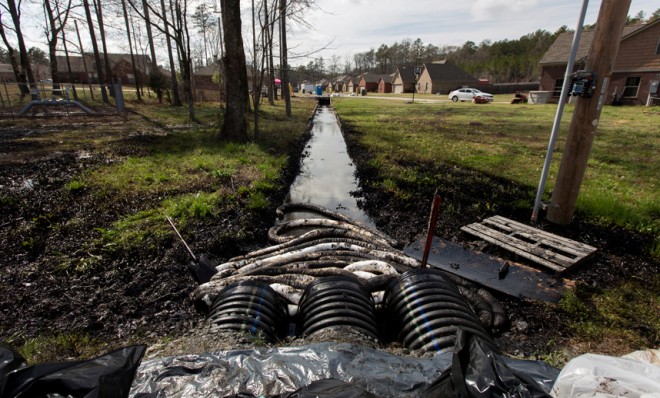The Arkansas oil leak: Proof the Keystone pipeline is dangerous?
Opponents of the controversial pipeline proposal say, "Told you so"


A free daily email with the biggest news stories of the day – and the best features from TheWeek.com
You are now subscribed
Your newsletter sign-up was successful
Exxon Mobil is busy cleaning up a Mayflower, Ark., neighborhood where thousands of barrels of heavy Canadian crude oil spilled last week, forcing the evacuation of 22 homes. Exxon officials are still trying to figure out what caused the leak from the 40-year-old Pegasus pipeline, which is buried two feet underground and can transport more than 90,000 barrels of oil per day from Patoka, Ill., to Nederland, Texas.
Environmentalists, however, aren't waiting for the final report to call the accident proof that it would be dangerous for President Obama to approve the controversial Keystone XL pipeline, which would be able to carry 800,000 barrels per day from Canada's tar sands to refineries on the Gulf Coast.
"Ruh roh," says John Aravosis at America Blog. "For all those worried about the safety of the proposed Keystone Pipeline, Exxon-Mobil’s oil spill this weekend in a small Arkansas town isn’t allaying anyone’s concerns." A massive spill in an inland area is a scenario that the State Department "openly fretted about, then ignored," says Aravosis. The Obama administration's attitude seems to be "environment, schmironment."
The Week
Escape your echo chamber. Get the facts behind the news, plus analysis from multiple perspectives.

Sign up for The Week's Free Newsletters
From our morning news briefing to a weekly Good News Newsletter, get the best of The Week delivered directly to your inbox.
From our morning news briefing to a weekly Good News Newsletter, get the best of The Week delivered directly to your inbox.
"These oil pipelines inevitably spill again and again, fouling our rivers, neighborhoods and wildlife habitat," says Jerry Karnas at the Center for Biological Diversity. "Building even more pipelines like Keystone XL across the heart of the American Midwest is only courting more trouble and more terrible spills."
Last week, Exxon was fined $1.7 million for a 42,000-gallon spill in the Yellowstone River, and the State Department has said the 1,700-mile Keystone pipeline, which would pass through habitat for more than 20 endangered species, could leak up to 100 times. Obama should make a harder push for clean energy instead of making the planet and the American people pay for "the costs and risks of Big Oil's disastrous drive for ever-greater profits," says Karnas.
Keystone's defenders, however, are pointing to the leak from this aging pipeline as another reason the new one is a no-brainer. "Perhaps in a strange kind of a way this makes a strong case for having new pipe infrastructure for moving this product around," Cal Dallas, Alberta's international relations minister, tells Canada's Globe & Mail.
Canadian Energy Minister Joe Oliver says the Arkansas spill should have no impact on the Keystone project — which Obama is expected to decide on this summer. America needs oil, Oliver says, and there are risks no matter how you move it around.
A free daily email with the biggest news stories of the day – and the best features from TheWeek.com
Harold Maass is a contributing editor at The Week. He has been writing for The Week since the 2001 debut of the U.S. print edition and served as editor of TheWeek.com when it launched in 2008. Harold started his career as a newspaper reporter in South Florida and Haiti. He has previously worked for a variety of news outlets, including The Miami Herald, ABC News and Fox News, and for several years wrote a daily roundup of financial news for The Week and Yahoo Finance.
-
 How the FCC’s ‘equal time’ rule works
How the FCC’s ‘equal time’ rule worksIn the Spotlight The law is at the heart of the Colbert-CBS conflict
-
 What is the endgame in the DHS shutdown?
What is the endgame in the DHS shutdown?Today’s Big Question Democrats want to rein in ICE’s immigration crackdown
-
 ‘Poor time management isn’t just an inconvenience’
‘Poor time management isn’t just an inconvenience’Instant Opinion Opinion, comment and editorials of the day
